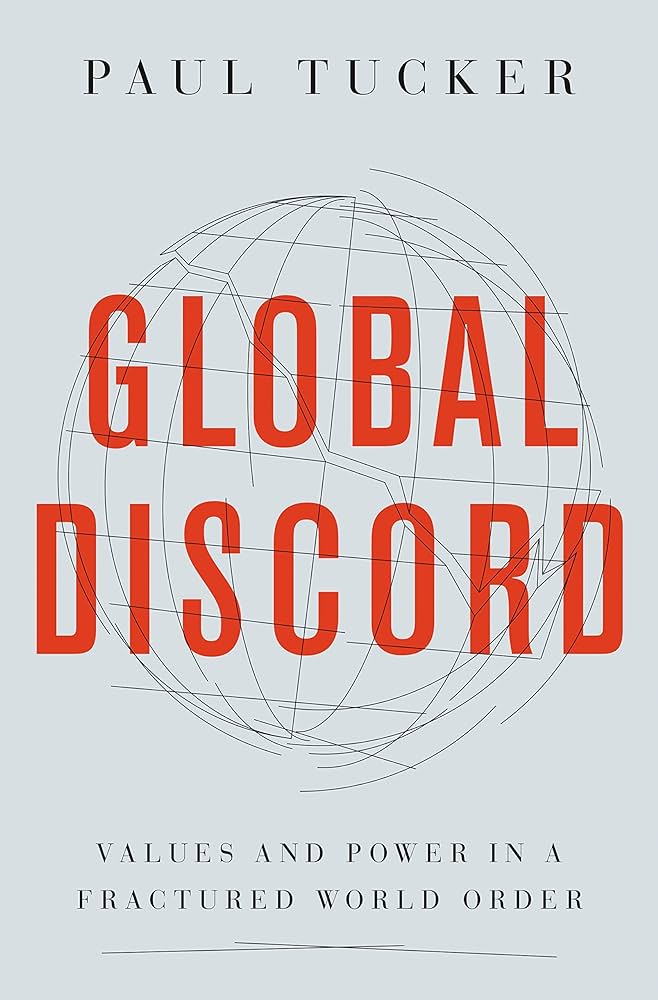Richard Godden: “Global Discord” by Paul Tucker

Global Discord does not fit neatly into any of the categories of book that are reviewed on this website. It is not primarily a book about business, capitalism or wealth and poverty. In fact, it is not primarily about economics. However, its focus is on something of crucial importance to all of these things: the global political order. Its author, Paul Tucker, the former Deputy Governor of the Bank of England, suggests that “the deep architecture of the international economy [is] influx for the first time in decades” (page 3) and he sets out to analyse both the causes of this and potential responses to it.
He never expressly identifies his intended audience. The primary audience is doubtless those responsible for formulating the policies of Western nations in relation to international affairs, including, in particular, international finance and trade. The issues that he discusses are, however, of crucial importance to a far wider audience. Unfortunately, the book is dense and heavy going in parts. This will limit its appeal but those who take the trouble to study it carefully will find it rewarding, particularly if they seek to reflect on how his suggested approaches to international engagement might be applied in their corner of the global political, financial or business world.
Tucker identifies three major differences between the kind of globalisation that we are now witnessing and that which existed in the past: first, derivative markets have separated cross-border flows of funds from flows of risk; secondly, after accumulating vast sovereign wealth funds, some states have acquired great influence in global capital allocation and, taken with state-owned enterprises, state-capitalist actors are operating on a scale that has not been seen “since Europe’s merchant companies traded and intervened around the planet half a millennium ago” (page 7); and, thirdly, today’s infrastructure for cross-border financial transactions create vulnerabilities that can be weaponised.
Tucker suggests that there is “a deep cleavage in modern international affairs” (page 78) and his overwhelming concern is China. He argues that the West needs to face up to the fact that, far from China moving in the direction of a liberal economic and political order, it is moving in precisely the opposite direction. Quoting the now well-known “Seven No’s” of the Chinese Central Committee, he points out that, “While Western states took different paths to [wielding power across their territories, the Rule of Law, and accountability], for China the destination is different” (page 220). Thus he argues, surely correctly, that “commentators in the West who insist current tensions are not ideological – and should not be allowed to become so – are deeply mistaken, while nevertheless pressing an important practical question: What to do?” (page 461).
He repeatedly accuses Western policy makers of wishful thinking in their dealings with authoritarian states and China in particular and he has many criticisms of current global institutions pointing to both specific design flaws and more general issues. Some of these criticisms relate to specific institutions: he describes the second Basel Capital Accord as “deeply flawed” (page 98) and suggests that the WTO is based on unrealistic universalistic rather than pluralistic concepts. Other criticisms are more general: he points to the hazards of delegation to international organisations, particularly in a world in which international treaties are what economists call “incomplete contracts”, and the dangers of what he refers to as “judicialization”.
His concern in relation to the latter is that international courts and tribunals are ruling on matters that ought to be left to political negotiation and are applying interpretations of treaties and even “natural law” concepts in a way that results in states being bound by things to which they do not believe they ever agreed. Some might argue that this is simply the concept of the Rule of Law applied in an international context but, as is the case in relation to some domestic systems (e.g. the role of the Supreme Court in the USA), it gives rise to a situation that is dangerously close to the Rule of Judges. In short, it is an example of judicial overreach and it has potentially serious political consequences for the perceived legitimacy of the world order, particularly when set against the context of the ideological divide to which Tucker draws attention.
Much of what Tucker says is thus critical of the existing order and those who have contributed to its creation. However, Global Discord is not a negative, destructive book. Tucker’s main aim is to assist in the building of a new global order that is based on coherence defensible principles whilst being capable of surviving in the real world. To this end he devotes a lot of space to analysing the theory of international relations and he suggests that we need to contemplate four broad scenarios for the next quarter to half century: “Lingering Status Quo (continuing US international leadership); Superpower Struggle (the scenario most resembling the long eighteenth century’s French-British contest); New Cold War (autarkic rival blocks); and Reshaped World Order (more Vienna 1815 than Washington 1990)” (page 115).
Against this background, he moves to more specific, concrete issues. The final part of the book includes chapters on the international economic system, the IMF and the international monetary order, the WTO and the system for international trade, preferential trade pacts and bilateral investment treaties and Basel and the international financial system, and the book concludes with an eight page appendix setting out, in numbered pithy points, Tucker’s suggested principles for constitutional democracies participating and delegating in an international system. No-one can accuse Tucker of merely dealing in abstract theory!
Tucker describes his approach as “realist” in the sense that it is “not a morality-first account deriving duties, rights, and legitimation principles from fundamental, externally given, universal principles, with some kind of morality system providing ultimate foundations” (page 268). However, he suggests that his approach does not “consign moral values to the side lines” since it requires “sociability with path-dependent, problem-solving norms, which leaves something to be said about the sources or mechanisms of normativity” (page 268).
Many will criticise this approach. Some will do so on the basis that it is insufficiently “realist”. Many others, especially Christians and others with strong moral compasses, will worry that morality plays an insufficient part in it and Tucker concedes that, in his view, the West has to adopt a “live and let live” policy and accept that engagement with illiberal regimes is necessary despite a possible desire to promote a universal morality-based international order.
Tucker is not a moral philosopher and he does not engage in detail with the moral issues. However, one does not have to accept moral relativism to conclude that there is a good moral case for his overall approach. A purist approach is highly unlikely to have the outcomes desired by its protagonists and could well result in outcomes that cause much suffering, whether by resulting in war or, more likely, by preventing co-operation over issues such as pandemics, mass-migration and climate change and by stifling international co-operation and trade, with the result that prosperity declines and poverty increases. Furthermore, Tucker bases his thesis on some fundamental tenets that are, at heart, moral: the desirability of peaceful co-existence; the idea that “order is not to be sniffed at: war and instability are quite a lot worse, as is fear of them” (page 323); the need to “stake out the ground that constitutional democracies should insist on to avoid sacrificing our deep domestic norms: to remain who we are” (page 356) whilst accepting that illiberal states will remain who they are; and the idea that perfection cannot be demanded, legitimacy is not binary and “Authority can be legitimate if it is the best realistically available” (page 287). Whilst this may not go far enough for some moral purists, there is, at least a strong argument to the effect that Tucker’s overall approach is likely to produce the best realistic outcome for the world political and economic order and is thus fundamentally ethically defensible.
The purists will also have difficulties with some of Tucker’s more specific statements. In particular, his suggestion that “We need to make judgements about the past only insofar as they materially affect the present (through institutions, norms, values, embedded habits, and so on)” (page 316) will not resonate well with those who are urging ever more delving into past wrongdoings. However, the purists have never explained how their approach leads to a world in which people are able to live together harmoniously and productively. Indeed, the proponents of the recent trend in legislation in the UK towards there being no time bar in relation to the raking up of the past should reflect on whether their proposals are as ethically pure as they like to believe. For example, Tucker suggests that “it is simply no good looking back to the Gulag” or various other dreadful episodes of the twentieth century (page 316) but this is precisely what the UK Prevention of Crime Act 2002 requires: it, unrealistically, regards an enterprise that has once been tainted by crime (e.g. those that benefitted from contracts with slave labour in the Gulags or those that assisted the Nazi regime) as forever tainted.
In developing his arguments, Tucker analyses in some detail different philosophical approaches to international affairs and different concepts and models of international co-operation (e.g. the nature of international law). He largely dismisses Thomas Hobbes’s extreme “realism” and criticises John Rawles’s demand for what he regards as an unrealistically “thick” and binary (“in or out”) international order, while acknowledging his debt to David Hume and Bernard Williams.
This analysis of the philosophical underpinning of Tucker’s concepts will enhance the attractiveness of Global Discord for some more academically minded readers. However, it is the primary reason why the book is dense and, in parts, heavy going. Tucker would doubtless argue that the analysis is essential to the development of his case and this is doubtless true. However, on occasions, the reader is left with the feeling that the analysis is a bit laboured and that the language could be simpler. This is a pity because it mars an otherwise excellent and important book that deserves to be widely read.
“Global Discord: values and power in a fractured world order” by Paul Tucker was published in 2022 by Princeton University Press (ISBN-13:9780691229317). 483pp.
 Richard Godden is a Lawyer and has been a Partner with Linklaters for over 30 years during which time he has advised on a wide range of transactions and issues in various parts of the world.
Richard Godden is a Lawyer and has been a Partner with Linklaters for over 30 years during which time he has advised on a wide range of transactions and issues in various parts of the world.
Richard’s experience includes his time as Secretary at the UK Takeover Panel and he is currently a member of the Panel. He also served as Global Head of Client Sectors, responsible for Linklaters’ industry sector groups, and was a member of the firm’s Executive Committee.
